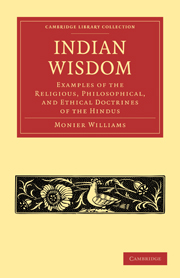Book contents
- Frontmatter
- PREFACE
- THE INDO-ROMANIC ALPHABET WITH THE EQUIVALENT SANSKṚIT LETTERS AND RULES FOR PRONUNCIATION
- Contents
- INTRODUCTION
- LECTURE I The Hymns of the Veda
- LECTURE II The Brāhmana Portion of the Veda
- LECTURE III The Systems of Philosophy
- LECTURE IV The Nyāya System of Philosophy
- LECTURE V The Sānkhya System of Philosophy
- LECTURE VI The Mimāṉsā System of Philosophy
- LECTURE VII Irregular Systems and Eclectic School
- LECTURE VIII Smṛiti. The Vedāngas
- LECTURE IX Smārta-sūtra. Gṛihya, ‘domestic rules’
- LECTURE X The Law-books. Mainu continued
- LECTURE XI Metrical Version of some of Manu's Moral and Religious Precepts
- LECTURE XII The Epic Poems
- LECTURE XIII The Mahā-bhārata
- LECTURE XIV The Epic Poems compared together and with Homer
- LECTURE XV The Artificial Poems
- INDEX
- ADDITIONS AND CORRECTIONS
- ORIENTAL WORKS
LECTURE I - The Hymns of the Veda
Published online by Cambridge University Press: 29 August 2010
- Frontmatter
- PREFACE
- THE INDO-ROMANIC ALPHABET WITH THE EQUIVALENT SANSKṚIT LETTERS AND RULES FOR PRONUNCIATION
- Contents
- INTRODUCTION
- LECTURE I The Hymns of the Veda
- LECTURE II The Brāhmana Portion of the Veda
- LECTURE III The Systems of Philosophy
- LECTURE IV The Nyāya System of Philosophy
- LECTURE V The Sānkhya System of Philosophy
- LECTURE VI The Mimāṉsā System of Philosophy
- LECTURE VII Irregular Systems and Eclectic School
- LECTURE VIII Smṛiti. The Vedāngas
- LECTURE IX Smārta-sūtra. Gṛihya, ‘domestic rules’
- LECTURE X The Law-books. Mainu continued
- LECTURE XI Metrical Version of some of Manu's Moral and Religious Precepts
- LECTURE XII The Epic Poems
- LECTURE XIII The Mahā-bhārata
- LECTURE XIV The Epic Poems compared together and with Homer
- LECTURE XV The Artificial Poems
- INDEX
- ADDITIONS AND CORRECTIONS
- ORIENTAL WORKS
Summary
IN the following Lectures I propose to offer examples of the most remarkable religious, philosophical, and ethical teachings of ancient Hindū authors, arranging the instances given in regular sequence according to the successive epochs of Sanskṛit literature. In attempting this task I am conscious of my inability to do justice in a short compass to the richness of the materials at my command. An adequate idea of the luxuriance of Sanskṛit literature can with difficulty be conveyed to occidental scholars. Perhaps, too, the severe European critic will be slow to acquiesce in any tribute of praise bestowed on compositions too often marked by tedious repetitions, redundant epithets, and far-fetched conceits; just as the genuine Oriental, nurtured under glowing tropical skies, cannot easily be brought to appreciate the coldness and severe simplicity of an educated Englishman's style of writing. We might almost say that with Hindū authors excellence is apt to be measured by magnitude, quality by quantity, were it not for the striking thoughts and noble sentiments which often reward the student who will take the trouble to release them from their surplusage of words; were it not also, that with all this tendency to diffuseness, it is certainly a fact that nowhere do we find the art of condensation so successfully cultivated as in some departments of Sanskṛit literature. Probably the very prolixity natural to Indian writers led to the opposite extreme of brevity, not merely by a law of reaction, but by the necessity for providing the memory with aids and restoratives when oppressed and debilitated by too great a burden.
- Type
- Chapter
- Information
- Indian WisdomExamples of the Religious, Philosophical, and Ethical Doctrines of the Hindus, pp. 1 - 26Publisher: Cambridge University PressPrint publication year: 2010

